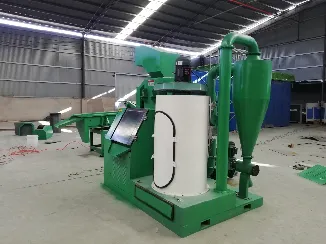

снеж . 06, 2024 18:52 Back to list
The Importance of Steel Scrap Processing Plants
In today's world, the recycling and processing of steel scrap have become essential components of sustainable manufacturing and environmental protection. Steel scrap processing plants are pivotal facilities that play a crucial role in the recycling industry, transforming discarded steel and metal products into reusable raw materials for new steel production. This article delves into the importance of these plants, their operational processes, and their contributions to both the economy and the environment.
The Role of Steel Scrap Processing Plants
Steel scrap processing plants are designed to collect, sort, and refine scrap metal, primarily steel, from various sources, including construction debris, automotive recyclables, and industrial waste. These facilities are equipped with advanced machinery and technologies that enable them to handle diverse types of metal scrap efficiently. By converting waste materials into valuable resources, these plants significantly reduce the volume of waste sent to landfills, thereby conserving natural resources and minimizing environmental impact.
One of the main functions of these plants is to segregate different types of metals, ensuring that the scrap is purified for subsequent recycling. The processing methods include shredding, shearing, and baling, which prepare the metal for melting. After being processed, scrap steel can be repurposed in the production of new steel products, which is both cost-effective and less energy-intensive than producing steel from virgin ore.
Economic Benefits
The steel scrap processing industry contributes significantly to the economy. It generates thousands of jobs in various segments, from collection and transportation to processing and sales. Moreover, scrap processing plants provide a supply of raw materials that can help stabilize the steel market. As global demand for steel continues to grow, the ability to recycle and reuse existing materials becomes increasingly valuable. By lowering the need for raw material extraction, these plants also help in reducing operational costs for steel manufacturers.

In addition, thriving scrap processing operations can attract investments and stimulate local economies. They often form partnerships with manufacturers, construction companies, and demolition firms, fostering a circular economy where scrap metal is continuously reused rather than discarded. Furthermore, the by-products from the processing can often be sold, generating additional revenue streams.
Environmental Impact
The environmental benefits of steel scrap processing plants are profound. The steel industry is one of the largest consumers of energy and is a significant source of greenhouse gas emissions. By recycling steel, we can drastically cut down on these emissions; recycling steel saves about 74% of the energy required to produce steel from raw materials. Additionally, it leads to a significant reduction in mining activity, which has detrimental effects on ecosystems and biodiversity.
Processing plants also help prevent water pollution by reducing the need for mining operations, which can lead to acid runoff and habitat destruction. By recycling scrap steel, plants contribute to less air and noise pollution as well, preserving local communities and wildlife.
Future of Steel Scrap Processing
As technological advancements continue to evolve, the future of steel scrap processing plants looks promising. Innovations such as automation, artificial intelligence, and improved sorting technologies are enhancing efficiency and productivity in recycling operations. Furthermore, the global push towards sustainability is likely to foster an increased demand for recycled materials, encouraging the development of more processing facilities.
In conclusion, steel scrap processing plants are vital for the economic and environmental sustainability of the steel industry. By recycling and reprocessing discarded steel, these facilities not only reduce waste and conserve natural resources but also contribute to job creation and economic growth. As we move forward, embracing and supporting the operations of these plants will be crucial for fostering a circular economy and mitigating the impacts of climate change.
Latest news
Troubleshooting Common Eddy Separator Problems
NewsJul.04,2025
The Role of Metal Recycling Plants in Circular Economy
NewsJul.04,2025
The Impact of Recycling Line Pickers on Waste Management Costs
NewsJul.04,2025
Safety Features Every Metal Shredder Should Have
NewsJul.04,2025
How Industrial Shredders Improve Waste Management Systems
NewsJul.04,2025
How Cable Granulators Contribute to Sustainable Recycling
NewsJul.04,2025